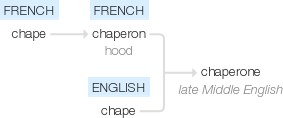Chaperon
late Middle English (denoting a hood or cap, regarded as giving protection): from French, feminine of chaperon ‘hood’, diminutive of chape (see chape). The current sense dates from the early 18th century.
wiktionary
From French chaperon(“hood”), from Middle French, "head covering", from Old French chape
etymonline
chaperon (n.)
"woman accompanying and guiding a younger, unmarried lady in public," 1720, from French chaperon "protector," especially "female companion to a young woman," earlier "head covering, hood" (c. 1400), from Old French chaperon "hood, cowl" (12c.), diminutive of chape "cape" (see cap (n.)). "... English writers often erroneously spell it chaperone, app. under the supposition that it requires a fem. termination" [OED]. The notion is of "covering" the socially vulnerable one. The word had been used in Middle English in the literal sense "hooded cloak."
"May I ask what is a chaperon?"
"A married lady; without whom no unmarried one can be seen in public. If the damsel be five and forty, she cannot appear without the matron; and if the matron be fifteen, it will do."
[Catharine Hutton, "The Welsh Mountaineer," London, 1817]
chaperon (v.)
"act as a chaperon, attend (an unmarried girl or woman) in public," 1792, also chaperone, from chaperon (n.), or from French chaperonner, from the noun in French. Related: Chaperoned; chaperoning.
